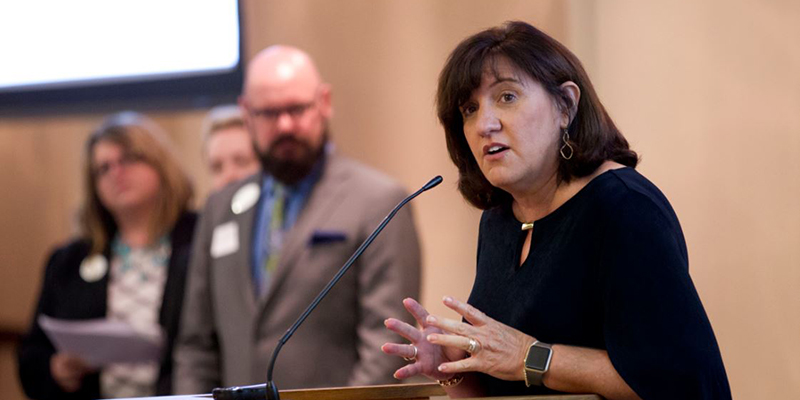New champions for elderly patients
By Jan Jarvis
As a pharmacist, Michelle Cefaretti dispenses medications to elderly patients every day. But when she wanted to do more to help her older patients and their caregivers, she didn’t know where to start.
The Geriatric Practice Leadership Institute changed that. As part of the program, the JPS Magnolia Health Clinic pharmacist worked on a team that was focused on connecting patients with dementia to area resources.
“The project has definitely helped me learn more about the great things that are out there to help with this special population,” Dr. Cefaretti said. “I think all of these things will be important as I continue to care for geriatric patients, especially those with dementia.”
The institute is part of Workforce Enhancement of Health Aging and Independent Living, or WE HAIL, which is funded by a $35.7 million federal grant that was awarded to UNT Health Science Center in collaboration with Texas Christian University, United Way’s Area Agency on Aging of Tarrant County and JPS Health Network.
Dr. Cefaretti is among the first graduates of the institute, which was developed to prepare health care professionals to serve as leaders in their institutions and to foster geriatric evidence-based practices. In the end, participants in the institute take away skills and knowledge that will improve the lives of older adults.
The 27 people who graduated June 9 represent health care organizations from throughout North Texas, including UNTHSC, JPS Health Network, Texas Health Harris Methodist Hospital, UT Southwestern, Medical Center, The Women’s Center, and Brookdale Senior Living.
Creating champions
The goal of the institute is to create “Geriatric Transformational Champions,” who will lead the effort to provide patient-centered quality primary care. The curriculum is focused on three pillars: learning about themselves as leaders, learning to lead teams and learning to lead change, said Diane Hawley, PhD, RN, Associate Professor of Professional Practice at Texas Christian University Harris College and one of the principal investigators of the WE HAIL grant.
During the 10-month Institute, interprofessional teams address health care issues affecting older people.
Falls, for example, are a common problem among geriatric patients, Dr. Hawley said. Team members developed ways to make better assessments of fall risks and thus reduce the number of people who are injured.
Another concern: the use of multiple medications. As people age they often take more and more medications, which can lead to drug interactions. By focusing on this issue, it is possible to reduce the number of drugs the person takes, Dr. Hawley said.
Lessons learned through the institute have meant geriatric patients are being connected with services that otherwise may have gone untapped, said Monique Barber, MPH, MBA, Project Manager, Geriatric Service Line, JPS Health Network. As a result of the recommendation made by team members, JPS brought benefits counseling to the clinic setting, she said.
“The patients received real-time connections to supportive resources,” she said. “Patients benefit from a clinic team that is caring, trained, and knowledgeable about the evolving needs of patients suffering from dementia, and of the caregiver.”
Leslie Henderson, who worked as a Health Information System Manager at UNTHSC, said her project was based on the use of a patient portal, which allows someone to contact their provider electronically to request refill prescriptions, see when their next appointment is and receive lab results.
Before the project, Henderson said she had no idea what was available to help the geriatric community.
“I learned so much,” she said. “I learned of organizations and practices that are devoted to helping the elderly, but the geriatric patients are often not aware of what is available to them.”
A growing population
As leaders in geriatric care, the graduates have their work cut out for them. The elderly population is growing rapidly.
By 2018, individuals 65 and older are expected to make up nearly 12 percent of the population in Tarrant County. Many of those individuals will be managing more than one chronic illness.
The challenges of caring for this aging population are made more critical by a shortage of physicians and nurses trained to meet their unique needs.
Many health care professionals were never educated on taking care of geriatric patients, Dr. Hawley said.
“Every curriculum teaches a lot about babies and adults but they don’t realize geriatrics is another category,” she said. “Caring for geriatric individuals can be very different from care for other adults.”
The institute is expected to further the effort to prepare healthcare professionals to address the unique needs that come with aging. It is supported by the Neeley School of Business, Harris College of Nursing and Health Sciences, and UNTHSC’s School of Public Health.
The Geriatric Practice Leadership Institute is one of two projects selected to receive awards from the National Association of Area Agencies on Aging. Through the UNTHSC’s partnership with United Way of Tarrant County’s Area Agency on Aging, the Geriatric Workforce Enhancement for Health Professionals and Medical Residency Students has also been selected.
“These awards showcase our programs and collaboration at a national level,” said Joanne T. Mize, MBA, MHA, Director of Operations, Center for Geriatrics, UNTHSC. “They also demonstrate how collaboration with our community partners leads to innovation and improved outcomes for older adults.”







Social media